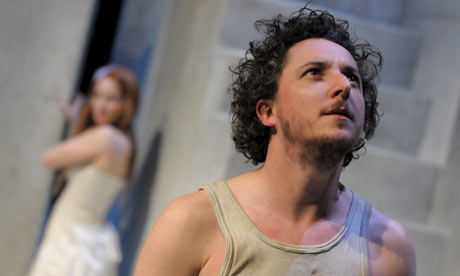
There was a time, back in the late 1980s and early 1990s, when "multimedia" was a real buzzword. In practice, what this meant was a few video screens dotted around a venue, merely the borrowed trappings of technology rather than a geniune attempt to make art or engage audiences in new ways. But the growth of pervasive media and digital technologies is offering theatre-makers and audiences unprecedented new challenges and opportunities. Unlike multimedia theatre, these technologies are not a passing fad; in fact they are as likely to have an impact on our theatregoing and theatre-making as the Oyster card, Facebook or mobile phones have had on our everyday lives.
Theatre Sandbox is one such opportunity. A new national scheme delivered by iShed (already responsible for the very successful Media Sandbox) is offering six companies (or artists) who wish to use media technologies in their work a chance to win one of six £10,000 commissions to create work in a supported environment and with the help of mentors. You certainly don't have to be a technology buff to apply. In fact, those who are new to digital technology will be welcomed because it's the idea that will be judged; you will be given the support to deliver it. The project is not set up to turn artists into geeks or create shows full of expensive kit, but rather to explore whether technology can help people to take creative risks, collaborate, develop audiences and enhance and extend the reach of the live theatre experience.
There are already plenty of examples of how technology has transformed theatre. Skype makes it possible for artists to collaborate across thousands of miles – and even closed borders – as projects such as Paves have proved. Research commissioned by Nesta into NT Live's pilots – in which performances are broadcast live to cinemas around the country, hugely widening the audience – has found that those experiencing the live event in cinemas had an even greater emotional engagement than those in the theatre. Companies such as Unlimited, with its show The Moon, the Moon, and Coney have explored how online engagement can enhance audiences' experience of the theatre event. Soho theatre has set up Soho Interactive, encouraging writers to engage with how storytelling can be changed and enhanced in the digital age.
As Andrew Taylor over at the Artful Manager has suggested, "participatory technology seems foreign to many, but it is also intriguing as it carries many of the qualities we value in the arts. [It] is by nature disruptive, but so is artistic expression." So rather than being scared of technology and seeing it as a threat to real-world social interaction, which research increasingly suggests it is not, why don't we embrace these new technologies, and use them to develop new forms of theatre?

